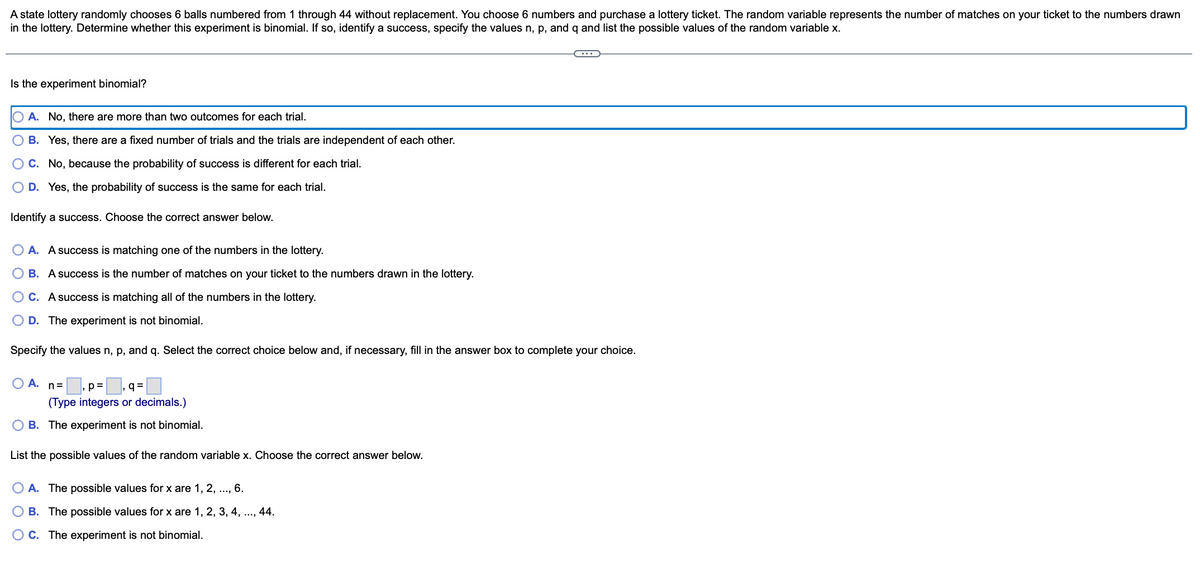A state lottery randomly chooses 6 balls numbered from 1 through 44 without replacement. You choose 6 numbers and purchase a lottery ticket. The random variable represents the number of matches on your ticket to the numbers drawn in the lottery. Determine whether this experiment is binomial. If so, identify a success, specify the values n, p, and q and list the possible values of the random variable x. Is the experiment binomial? OA. No, there are more than two outcomes for each trial. B. Yes, there are a fixed number of trials and the trials are independent of each other. O C. No, because the probability of success is different for each trial. O D. Yes, the probability of success is the same for each trial. Identify a success. Choose the correct answer below. OA. A success is matching one of the numbers in the lottery. OB. A success is the number of matches on your ticket to the numbers drawn in the lottery. OC. A success is matching all of the numbers in the lottery. OD. The experiment is not binomial. Specify the values n, p, and q. Select the correct choice below and, if necessary, fill in the answer box to complete your choice. OA. n=p= p= .q= (Type integers or decimals.) OB. The experiment is not binomial. List the possible values of the random variable x. Choose the correct answer below. OA. The possible values for x are 1, 2, ..., 6. OB. The possible values for x are 1, 2, 3, 4, ..., 44. OC. The experiment is not binomial.
A state lottery randomly chooses 6 balls numbered from 1 through 44 without replacement. You choose 6 numbers and purchase a lottery ticket. The random variable represents the number of matches on your ticket to the numbers drawn in the lottery. Determine whether this experiment is binomial. If so, identify a success, specify the values n, p, and q and list the possible values of the random variable x. Is the experiment binomial? OA. No, there are more than two outcomes for each trial. B. Yes, there are a fixed number of trials and the trials are independent of each other. O C. No, because the probability of success is different for each trial. O D. Yes, the probability of success is the same for each trial. Identify a success. Choose the correct answer below. OA. A success is matching one of the numbers in the lottery. OB. A success is the number of matches on your ticket to the numbers drawn in the lottery. OC. A success is matching all of the numbers in the lottery. OD. The experiment is not binomial. Specify the values n, p, and q. Select the correct choice below and, if necessary, fill in the answer box to complete your choice. OA. n=p= p= .q= (Type integers or decimals.) OB. The experiment is not binomial. List the possible values of the random variable x. Choose the correct answer below. OA. The possible values for x are 1, 2, ..., 6. OB. The possible values for x are 1, 2, 3, 4, ..., 44. OC. The experiment is not binomial.
Holt Mcdougal Larson Pre-algebra: Student Edition 2012
1st Edition
ISBN:9780547587776
Author:HOLT MCDOUGAL
Publisher:HOLT MCDOUGAL
Chapter6: Ratio, Proportion, And Probability
Section6.7: Probability And Odds
Problem 2C
Related questions
Question

Transcribed Image Text:A state lottery randomly chooses 6 balls numbered from 1 through 44 without replacement. You choose 6 numbers and purchase a lottery ticket. The random variable represents the number of matches on your ticket to the numbers drawn
in the lottery. Determine whether this experiment is binomial. If so, identify a success, specify the values n, p, and q and list the possible values of the random variable x.
Is the experiment binomial?
A. No, there are more than two outcomes for each trial.
B. Yes, there are a fixed number of trials and the trials are independent of each other.
C. No, because the probability of success is different for each trial.
D. Yes, the probability of success is the same for each trial.
Identify a success. Choose the correct answer below.
A. A success is matching one of the numbers in the lottery.
B. A success is the number of matches on your ticket to the numbers drawn in the lottery.
C. A success is matching all of the numbers in the lottery.
O D. The experiment is not binomial.
Specify the values n, p, and q. Select the correct choice below and, if necessary, fill in the answer box to complete your choice.
OA. n=
,p=
q=
(Type integers or decimals.)
O B. The experiment is not binomial.
List the possible values of the random variable x. Choose the correct answer below.
O A. The possible values for x are
B. The possible values for x are 1, 2, 3, 4, ..., 44.
OC. The experiment is not binomial.
...,
Expert Solution
This question has been solved!
Explore an expertly crafted, step-by-step solution for a thorough understanding of key concepts.
This is a popular solution!
Trending now
This is a popular solution!
Step by step
Solved in 6 steps

Recommended textbooks for you

Holt Mcdougal Larson Pre-algebra: Student Edition…
Algebra
ISBN:
9780547587776
Author:
HOLT MCDOUGAL
Publisher:
HOLT MCDOUGAL


College Algebra (MindTap Course List)
Algebra
ISBN:
9781305652231
Author:
R. David Gustafson, Jeff Hughes
Publisher:
Cengage Learning

Holt Mcdougal Larson Pre-algebra: Student Edition…
Algebra
ISBN:
9780547587776
Author:
HOLT MCDOUGAL
Publisher:
HOLT MCDOUGAL


College Algebra (MindTap Course List)
Algebra
ISBN:
9781305652231
Author:
R. David Gustafson, Jeff Hughes
Publisher:
Cengage Learning